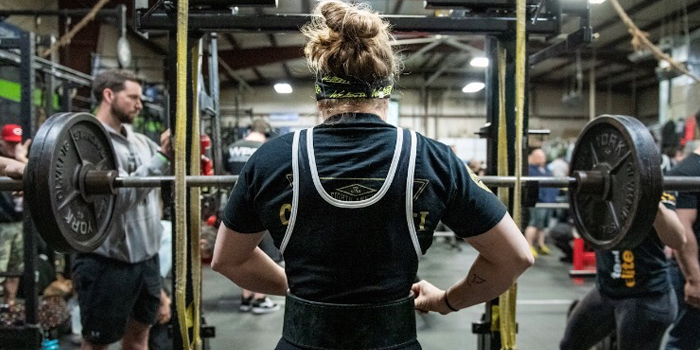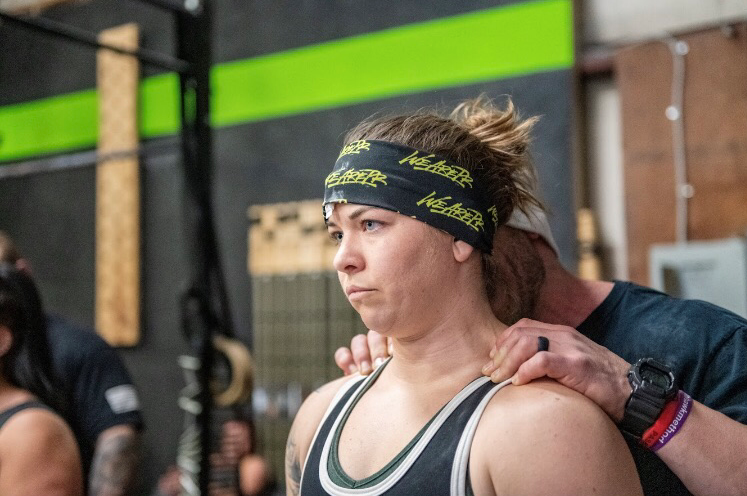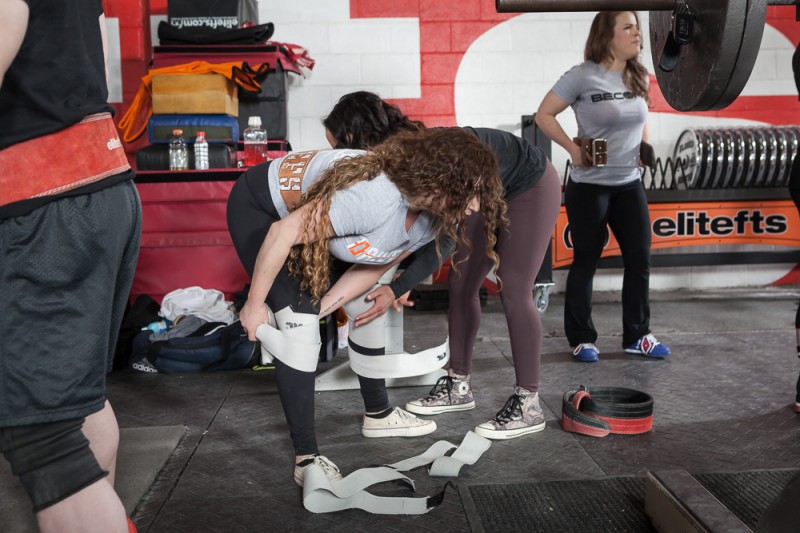
When you walk into a powerlifting meet, either as a spectator or a competitor, you most likely are looking around the room trying to find the strongest motherfluffer out there, right? You do this in the physical sense by how someone looks or even the weight they are warming up with. I’ll tell you this: You can be physically the strongest person in the room but still have the weakest mindset or emotional health. And those things will catch up to you in training and on the platform.
“Strong” is a relative word. Strong compared to what? My grandma? I mean, yeah, in regards to physicality. But strong in regards to maybe emotional or mental strength? Maybe not. My grandmother has watched two of her children pass away too early, lost her husband too early, and suffered plenty of other hardships. And she’s still kicking pretty well at 89 years old.
RECENT: 5 Things Beginners and Intermediate Lifters Should Understand
Powerlifting is so much more than physical strength. How many lifters psych themselves out of a lift on the platform that they’ve hit several times in training? How many lifters bomb out because they got a shitty call from a judge and can’t get it out of their head? How many lifters make stupid choices in training and then proceed to fail at the meet but don’t understand why? You must have several strength qualities in order to be successful. Although this doesn’t apply to some of those genetic freaks who have what I call mentally challenged strength, but that’s a topic for another day. Let’s elaborate in each category.
Physical Strength
This one is a no-brainer. Obviously, the goal of powerlifting is absolute strength or to be the strongest in the squat, bench, and deadlift. There are a lot of factors that come into play here. Intelligent programming, execution of said programming, and your physical capacity for strength. I’m not going to go any deeper than that as I believe most successful lifters possess not only great physical strength but much more of the ones listed below.

Mental Strength
Mental fortitude is a necessity in any life endeavor. Possessing this quality takes real work and will aid in the success in training and competition. Let’s say you are taking a 3RM and you’re set to PR. You miss your attempt, and it’s lower than your previous 3RM. How do you respond? Do you get pissed off and pout about it? Do you have negative self-talk? Do you blame your coach or the elements around you? Do you get mad and try to go up in weight anyways only to fail again? That’s a loser’s mentality.
You had one bad day of training, and you want to come up with thousands of excuses. Then you continue to make poor choices in training or at the meet because you have to prove to your ego you’re better than that. I’m not saying you should have rainbows and unicorns flying out your rear end. But I think this is a perfect example of re-evaluating yourself and having the proper attitude and mental fortitude to continue to make smart decisions.
Do you give up and just say, “Screw it,” and storm out of the gym? Sure, be a drama queen. But those who are able to compose themselves, evaluate the situation rationally, continue on with the program, and make changes as necessary are practicing mental strength. They are not letting their ego take over. They are not allowing negative thoughts and worry to cause further disruption. They are taking the failure as a positive and taking the time to think out how to properly fix it.
RELATED: Guidelines for Injury-Free Progress: Controlling Intensity
Maybe your form was off, maybe you had to train back-to-back because of your schedule, or maybe your nutrition was crappy the last few weeks. There are several factors that contribute to physical failure. But taking the time to figure out the why without making excuses or blaming anyone but yourself is key.
This is perfect practice for when things don’t go your way on meet day. You get a bad call from the judges and miss an easy weight. Or you’ve hit a second attempt several times in training but it doesn’t budge on meet day. Are you going to crumble? Or will you use your mental strength to calm yourself, have positive self-talk and execute?
I have been semi-close to bombing out in two of the biggest meets I’ve ever done. Really, it was more fear creeping in that I MIGHT bomb out. At my very first Arnold and my first Cincinnati Women’s Pro-Am, I missed my first squat attempt, and both times, I remained composed and asked myself, “Did you train this hard and dedicate all of this time to come up here to bomb out? No.” In both of these meets, I hit my second attempt and finished with meet PRs. I didn’t let myself freak out. I definitely felt it, though.
I wanted to run around screaming and crying like the first chick that dies in a horror film. But I didn’t. I remained calm, asked myself how I needed to fix it, and told myself I was going to hit my next one.
Visualizing a successful lift is also a great tool to use. I practice this in training and on meet day. I see myself being successful, and while I have not hit every single lift I wanted, overall, it has aided in my success.
Intellectual Strength
So this one is going to slightly mirror both mental strength and emotional intelligence. I’m referring to your ability to continue to learn and apply this knowledge to your training. You have the mental strength down, but if you do not know the why or how to figure out the why for a failed lift, then positive talk and visualization won’t do much for you. You have to have some sort of knowledge of what you’re doing.
You missed your squat because you did not externally rotate. Or you didn’t hip hinge and broke the squat with your knees first. This not only applies to technique but also to your programming. Maybe you are too beat up for your max effort day because of the accessories or frequency of your program.
Whether you have a coach or not (hopefully you do), this is knowledge you need to have as a lifter. You will only go so far with an online 5-3-1 program with made-up accessories. If you don’t understand the reasons behind programming, technique, mechanics, or other elements of lifting, at some point, you’ll plateau and fail and most likely continue to fail and not understand why.

Do you know how many times I see lifters who just competed a week before, only to come back into the gym to have a max effort day? Why can’t you hit the same or more weight since your competition? You should have literally PEAKED to have peak strength on meet day. I currently have a 425-pound 1RM deadlift but that doesn’t mean I can come in and hit that weight any time any day year-round. Powerlifting programs are designed, again, to give you peak strength on meet day.
READ MORE: The Mind-Muscle Link
Although there are some of those genetic freaks that are able to continuously lift heavy, and I’ve seen many of them have success with it, but most likely, that is not you. Actually, I’m just going to say it: It is not you.
So, with all that said, my point is that if you possess some sort of intellectual strength, you will develop, learn more about your sport, and be able to apply this to your training. Moving on.
Emotional Intelligence
This one will also mirror mental strength. Remember when you missed that 3RM? How did you react? Calm? Controlled? Or did you push the bench over and light it on fire out of anger?
I’ve felt like that before, and I’ve certainly overreacted to a missed lift. I think it’s OK to have an emotional response to a failed or successful lift. But I also believe you have to control your emotions in some instances. It’s okay to get pissed off when you miss a weight, but what is your reaction?
This can even be applied to relationships or life in general. Obviously, we are humans, built with emotions. But your reactions to emotions are what can cause trouble. You can’t let your emotions control you. This has to do with self-awareness.
Do you know that you are an emotional lifter? There’s nothing wrong with that. You recognize that, so you are able to be aware of your response. You may use your self-awareness to your advantage. You know not to get too hyped up before a first attempt in competition. You know you need to get away from the crowd and calm yourself before you attempt any lift. You’re also able to tell your lifting partners this so they are aware of how to handle you. All lifters, in general, should have some form of emotional awareness and intelligence.
When missing a lift, instead of bailing or screaming and running out of the gym, take a brief moment, evaluate the situation, and control your thoughts. I’m not saying all reactions are bad or emotional lifters aren’t successful.
I am, in a sense, an emotional lifter, as you will know exactly how I feel about a lift at a meet. I bring a lot of energy and emotion to my training and competitions. But I am aware of this and am able to use it as a positive. I’ve had several spectators and other lifters compliment my energy at meets. I believe it’s because you can see my passion for the sport and I am doing my best to have a positive aura.
For the most part, I am composed and doing my best to make smart decisions on the platform. This is all because of what I’ve learned over my short time in powerlifting and from many years of competing in other sports.
Hopefully, this article will open your eyes to what exactly being strong truly is.
Elyse Lovelace is an elite-level 132-pound and 148-pound powerlifter from Memphis, Tennessee. She began her athletic career in soccer and was recently inducted into the Sports Hall of Fame for her soccer accomplishments at Northwest Mississippi Community College. Elyse began powerlifting in 2015 and currently has a 1,005-pound total at 148 pounds: 375-pound squat, 205-pound bench, and 425-pound deadlift.










